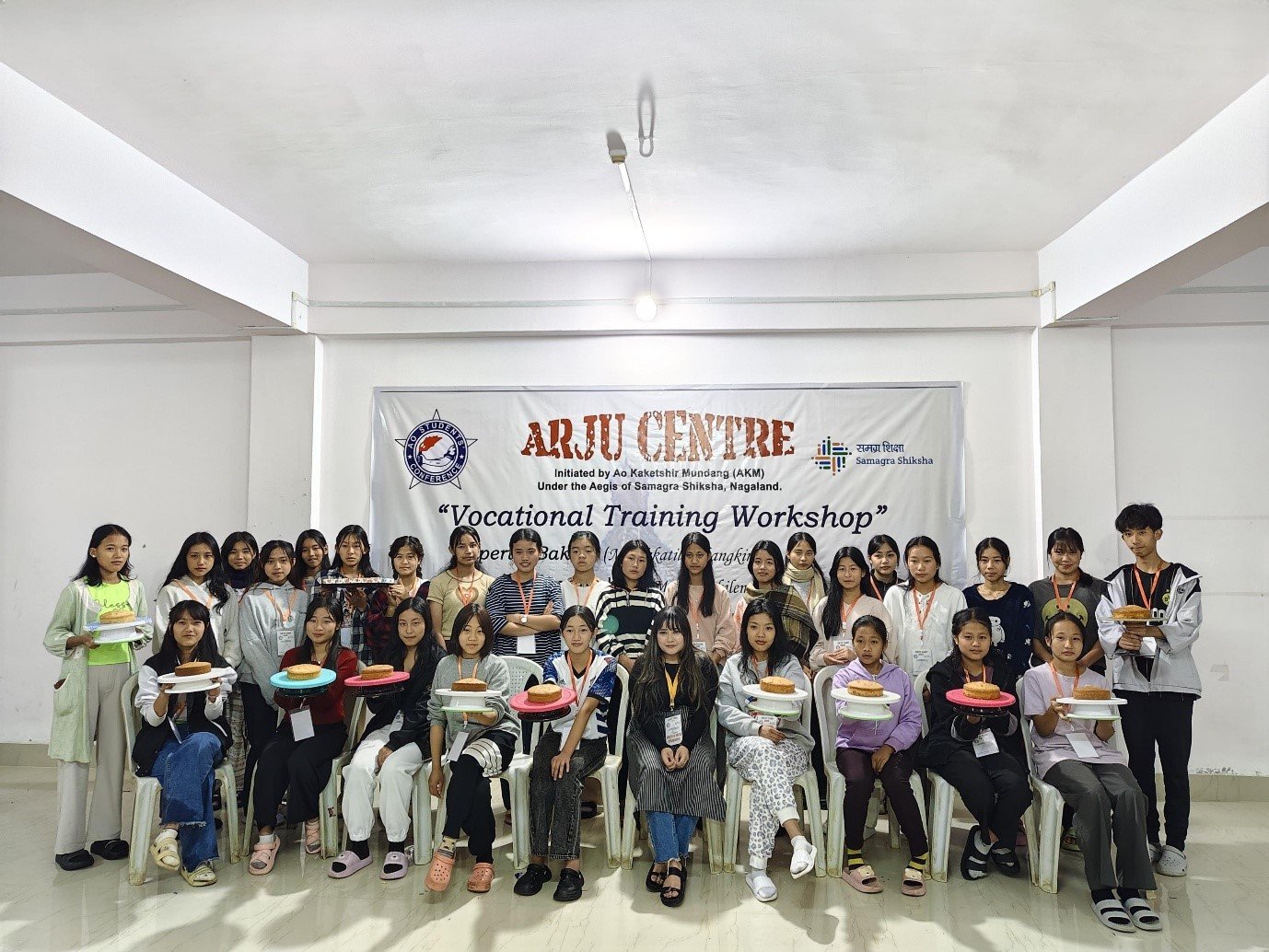The three-day Arju Camp 2025, initiated by the Ao Students’ Conference (AKM) under the aegis of Samagra Shiksha Nagaland, commenced on March 12 at Watsü Women Resource Centre, Marepkong, Mokokchung, and will culminate on March 14. Over 100 students from 12 Arju Centres in Mokokchung District are attending the camp.
On the first day of the workshop, students participated in hands-on mentorship training in baking, soap making, and electrification. The sessions were conducted by Tekatila Changkiri for baking, Washilemla for soap making, and Er. Mayangtoba Longkumer for electrification, who served as the Resource Persons.

During the soap-making session at the camp, thirty-one students participated. The students were trained using locally available ingredients such as turmeric, tomato, and lemon to create handmade soaps. The Baking session was participated by thirty-five students where they were mentored on the process of making butter cake and vanilla cake step by step. The Electrification session witnessed thirty-four students partaking in practical lessons on the basic electrification process.

During the introduction and briefing session, Lanutoshi Aier, President of AKM, highlighted the significance of the Arju Centre (Morung Concept of Education), established in October 2022 as part of an innovative education initiative under the Ministry of Education, Government of India. Under Samagra Shiksha Nagaland, 12 Arju Centres are currently operating—one each in two villages across the six ranges of the Ao region—offering remedial classes with a focus on Mathematics, Science, English, Hindi, and local languages. In addition to academics, the centres emphasize community service, sports, and extracurricular activities, ranging from kitchen gardening to waste segregation.
The Morung Centres have been set up in rural Mokokchung applicable to students from government schools and dropouts to provide alternative learning spaces for students, offering not only remedial classes in core subjects but also opportunities to gain traditional knowledge, arts and crafts skills, soft skills, social etiquette, and life skills. Additionally, these centres provide training in reading and speaking skills, basic music concepts, arts and crafts, games and sports and digital literacy. They also aim to enhance financial literacy, empowering individuals, reducing vulnerability, and promoting economic growth, while fostering skill development essential for both real-world and academic settings.

According to Aier, Nagaland currently has four Morung Centres located in Phek, Mokokchung, and Tuensang. He described the Arju Centre in Mokokchung as one of the most active and best-performing among them as per reports. He appreciated the dedication and efforts of the mentors, acknowledging their hard work and smart work, as well as the students’ contributions to the centre’s success. Aier further stated that the continuation of the Arju Centre would depend on the performance of both the mentors and students, as this would determine whether the Memorandum of Understanding (MoU) for the centre would be extended for the next session. He encouraged all involved to continue their positive contributions.

Download Nagaland Tribune app on Google Play

Student Rongsensalang from Mongsenyimti Arju Centre shared his experience at ARJU CAMP, expressing his appreciation for the efforts of AKM and their mentors in providing a platform for students to gain real-life practical knowledge.
He attended the Soap Making session with his friends, where he learned the process of making soap. He shared that he had discovered a new technique from the resource person, which he plans to teach his friends at their Arju Centre. He further added that from now on, if they lack access to soap, he will utilize his learning to make it himself and his family.

The ARJU CAMP, Initiated by the Ao Kaketshir Mungdang (AKM), aims to provide vocational training, cultural exposure, and discussions on preserving the Ao language and traditions.
On March 13, the participants will embark on a guided tour to Chungliyimti Village, Tuensang, a place of historical significance for the Ao community. The visit will provide an opportunity to explore the cultural heritage and traditional way of life of the Aos, deepening their understanding of their ancestral roots.
In the afternoon and evening, the camp will host two seminar sessions on “Tetsü Oshi Wazüka Ayuba,” focusing on the preservation of the Ao language and oral traditions. The first session will be led by Dr. Chubatola Aier while the second session will be conducted by Temjen Tzüdir.
On the final day, March 14, participants will engage in an Activity Review & Presentation, where they will reflect on their experiences and learning from the camp.

